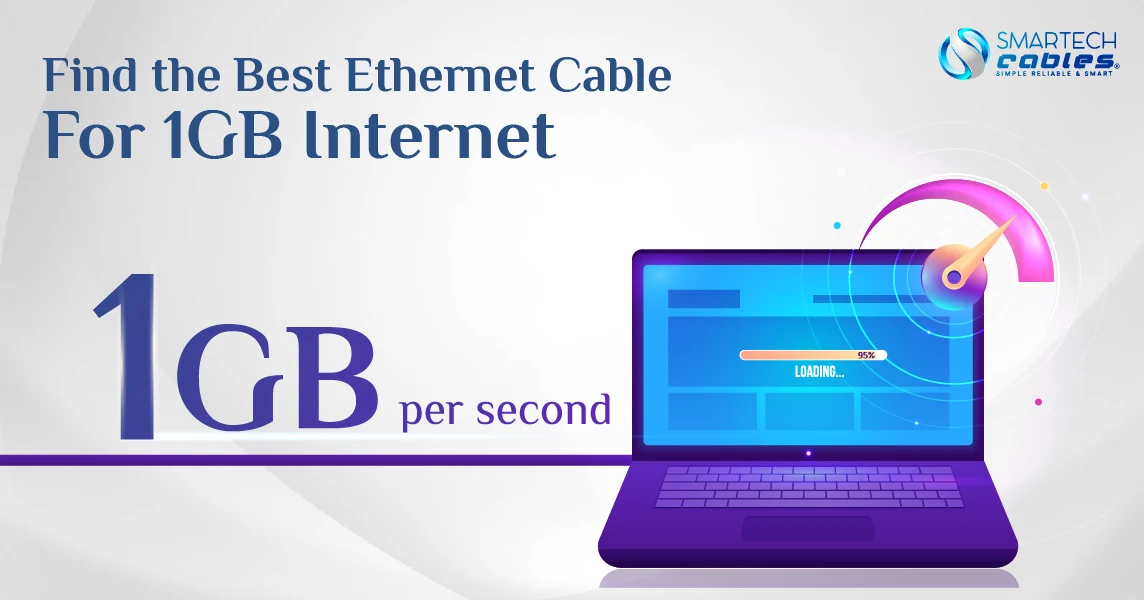
Are you struggling with slow downloads, laggy gaming, or choppy video calls on your 1GB internet? You’re not alone. Many tech and internet-using people rely on fast, reliable internet for work, gaming, or streaming, but a weak Ethernet cable can ruin the experience. Choosing the best Ethernet cable for 1GB of internet ensures you get the speed and stability your connection promises. Whether you’re a gamer needing a gigabit Ethernet cable for low latency or a small business owner setting up a network, the right cable matters.
Based on industry standards like TIA/EIA-568 and network performance testing, we know that Cat5e, Cat6, or Cat8 cables can deliver 1 Gbps speeds, offering varying benefits such as shielding for reduced interference. This guide explains cable categories, key features, and top picks to help you find the perfect match for your needs. Say goodbye to buffering and hello to seamless connectivity! Continue reading to discover the best Ethernet cables for gaming, home, or office use, and learn how to select the perfect one for your needs.
Why Choosing the Best Ethernet Cable for 1GB Internet Matters
You wouldn't put regular gas in a sports car and expect top performance, right? The same logic applies to your internet connection. A high-quality Ethernet cable is the essential link that delivers those gigabit speeds from your modem to your devices.
What is Gigabit Internet?
Gigabit internet delivers speeds of up to 1 gigabit per second (1 Gbps), which is roughly equivalent to 1,000 megabits per second. At these speeds, you can download a full HD movie in under a minute or backup your entire photo library in minutes instead of hours.
Many wonder about the difference between regular Ethernet cables and gigabit Ethernet cables. A gigabit Ethernet cable isn't a special category – it's any cable rated to handle speeds of at least 1 gigabit per second (Gbps). This includes Cat5e and above cables, which we'll explore later.
Ethernet vs. Wi-Fi for 1GB Internet
While Wi-Fi is convenient, a wired Ethernet connection is the gold standard for getting the most out of your gigabit internet service. Here's why a fast internet cable network beats wireless every time for speed-critical applications:
|
Feature |
Ethernet |
Wi-Fi |
|
Speed |
Consistent speeds close to your plan's maximum |
Variable speeds, often 30-60% lower than wired |
|
Latency |
Lower (1- 5ms) |
Higher (5- 20ms+) |
|
Reliability |
Stable connection, unaffected by walls or interference |
Can drop or slowdown due to interference, distance, or obstacles |
|
Setup |
Requires cable routing |
No cables, more straightforward setup |
|
Ideal for |
Gaming, 4K streaming, large file transfers, video conferencing |
Casual browsing, mobile devices, convenience |
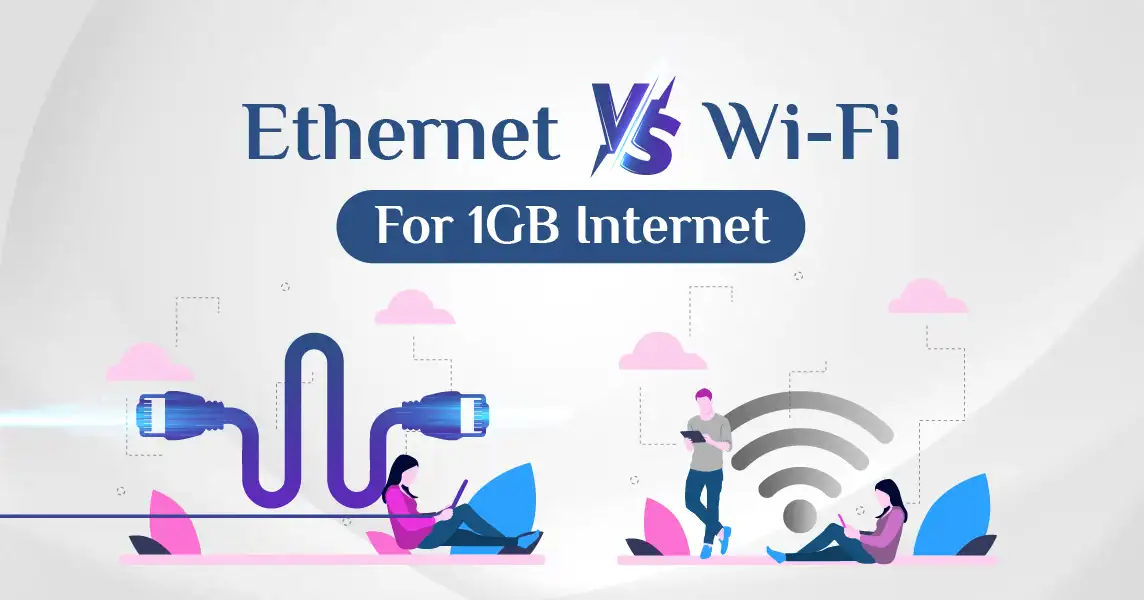
According to a study by the Telecommunications Industry Association (TIA), Ethernet connections typically deliver 20-30% more of your subscribed bandwidth than Wi-Fi. That's significant when you're paying premium prices for gigabit service.
Ethernet Cable Categories for Gigabit Internet
Not all Ethernet cables are created equal. Each category (denoted by "Cat" followed by a number) has different specifications based on the TIA/EIA-568 standards. These specifications determine maximum speed, bandwidth, and distance capabilities.
Cat5e: The Budget-Friendly Option
Cat5e (Category 5 enhanced) is the minimum standard for purchasing an Ethernet cable for 1GB internet. Introduced in 2001, these cables:
- Support speeds up to 1 Gbps
- Operate at 100MHz bandwidth
- Work reliably up to 328 feet (100 meters)
- Costs less than the higher categories
For most home users, Cat5e plenum cable provides excellent value and performance. If you're wondering what Ethernet cable for 1GB makes sense on a budget, Cat5e strikes the sweet spot of affordability and capability, making it the best choice for home internet setups.
Cat6 and Cat6a: Future-Proofing Your Network
If you're setting up a network that you don't want to rewire anytime soon, Cat6 or Cat6a makes excellent sense.
Cat6 cables:
- Support 1 Gbps speeds up to 328 feet (100 meters)
- Can handle 10 Gbps up to 164 feet (55 meters)
- Operate at 250MHz bandwidth
- Include better insulation to reduce crosstalk
The Cat 6 gigabit Ethernet cable represents an excellent middle ground for users who may eventually upgrade to faster internet speeds.
Cat6a ("augmented" Cat6) takes things further:
- Supports 10 Gbps speeds up to the full 328 feet (100 meters)
- Operates at 500MHz bandwidth
- Features include improved shielding for less interference
- Performs better in environments with electronic noise
If you're wondering what cable to use for 10GB Ethernet connections, Cat6a is better and faster than Cat6, and this is often the sweet spot of performance and cost.
Cat7 and Cat8: Overkill for 1GB?
For most home users with 1GB internet, Cat7 and Cat8 cables offer capabilities you likely won't need anytime soon, but they do provide maximum future-proofing.
Cat7 cables:
- Support 10 Gbps speeds easily
- Can achieve up to 40 Gbps at shorter distances
- Operate at 600 MHz bandwidth
- Feature comprehensive shielding on each wire pair and the overall cable
Cat8 Ethernet cable is the current gold standard:
- Supports up to 25- 40 Gbps speeds
- Operates at a massive 2000MHz bandwidth
- Is limited to shorter runs (30 meters maximum)
- Represents the best Ethernet cable for 2GB internet and beyond
Suppose you're installing cables in walls or other hard-to-access areas where replacement would be difficult. In that case, the extra investment in bulk Cat6a Cable or higher might be worthwhile for future-proofing, even if it's beyond what you need for current 1GB connections.
Top Picks for the Best Ethernet Cable for 1GB Internet
With the technical details covered, let's examine specific recommendations for various use cases.
Best for Gaming: Cat6 and Cat6a Cables
Gamers need the lowest possible latency and rock-solid stability. The best Ethernet cable for 1GB internet, specifically for gaming, needs to provide consistent performance without hiccups.
Top Recommendations:
- Cat6A Ethernet Cables —The cable design makes routing easier, and the snagless connectors prevent damage during installation or repositioning.
- RJ45 Cat6 Cable- Offers excellent performance at a reasonable price point, making it ideal for gamers on a budget.
- Cat6a Shielded Riser Cable - The shielded design helps eliminate interference that can cause lag spikes during critical gaming moments.
These cables ensure you achieve the lowest possible ping times on your gigabit connection, giving you a competitive edge in fast-paced games like those on the PS5.
Best for Home Use: Cat5e and Cat6
For standard home use where you're streaming, browsing, and occasionally transferring files, Cat5e and Cat6 cables offer the best balance of performance and value.
Top Recommendations:
- Cat5e Ethernet cables - SmarTech Cables offers the best Ethernet cable for 1GB internet at entry-level pricing. These no-frills cables reliably get the job done.
- Cat5e Plenum CCA Cable - Features a durable jacket and quality connectors for regular use.
- Shielded Riser Jacket Cat6 - Slightly more expensive than Cat5e options, but provides future-proofing at a reasonable price point.
For most homes, these cables will deliver the full speed of your gigabit connection without breaking the bank.
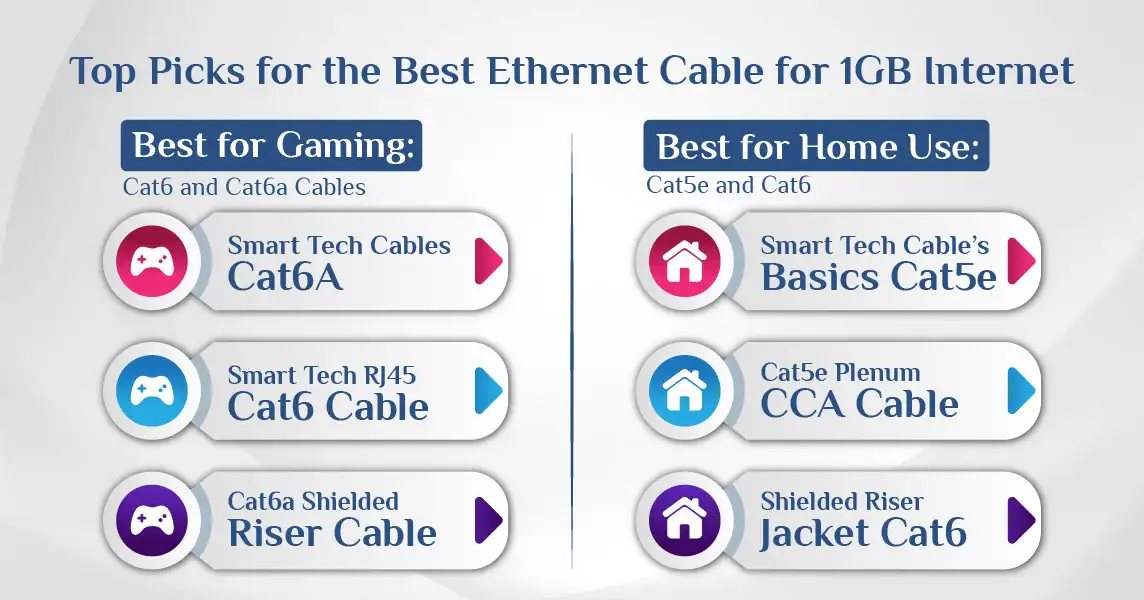
Key Features to Look for in a Gigabit Ethernet Cable
Beyond the category rating, several other factors determine the quality and performance of Ethernet cables.
Shielding: UTP vs. STP
Shielding is a crucial factor when selecting the type of Ethernet cable to use for gigabit internet, particularly in environments with electrical interference. For a detailed comparison, refer to our blog on STP vs. UTP cables.
Unshielded Twisted Pair (UTP)
- Most common and affordable
- Sufficient for most home environments
- Less bulky and more flexible
- Easier to terminate and install
Shielded Twisted Pair (STP)
- Better protection against electromagnetic interference
- Essential near power lines or heavy electrical equipment
- Typically more expensive
- Slightly less flexible than UTP
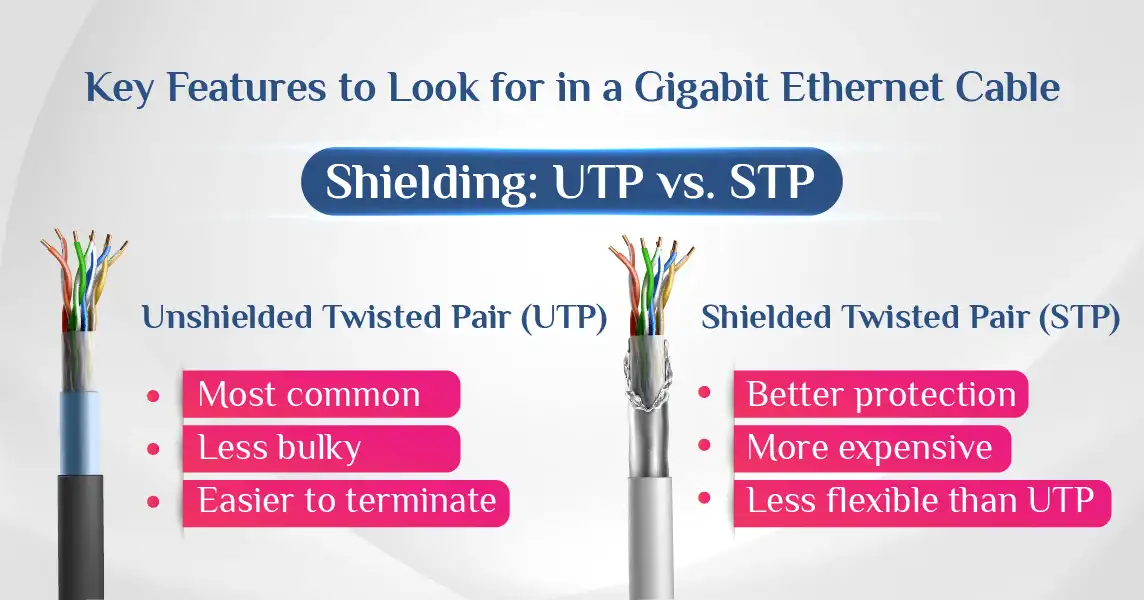
If you're installing cables near fluorescent lights, alongside power cables, or in industrial settings, STP cables are worth the extra cost to prevent interference.
Conductor Material: Copper vs. CCA
The material used for the wires inside your gigabit Ethernet cable has a significant impact on performance and longevity.
Learn more about: differences between CCA and pure copper cables.
Pure Copper
- Superior electrical conductivity
- Better signal quality over longer distances
- Improved durability and heat resistance
- Generally more expensive
Copper-Clad Aluminium (CCA)
- More affordable option
- Adequate for shorter runs (under 50 feet)
- Less flexible and more prone to breaking
- May not meet building codes for in-wall installation
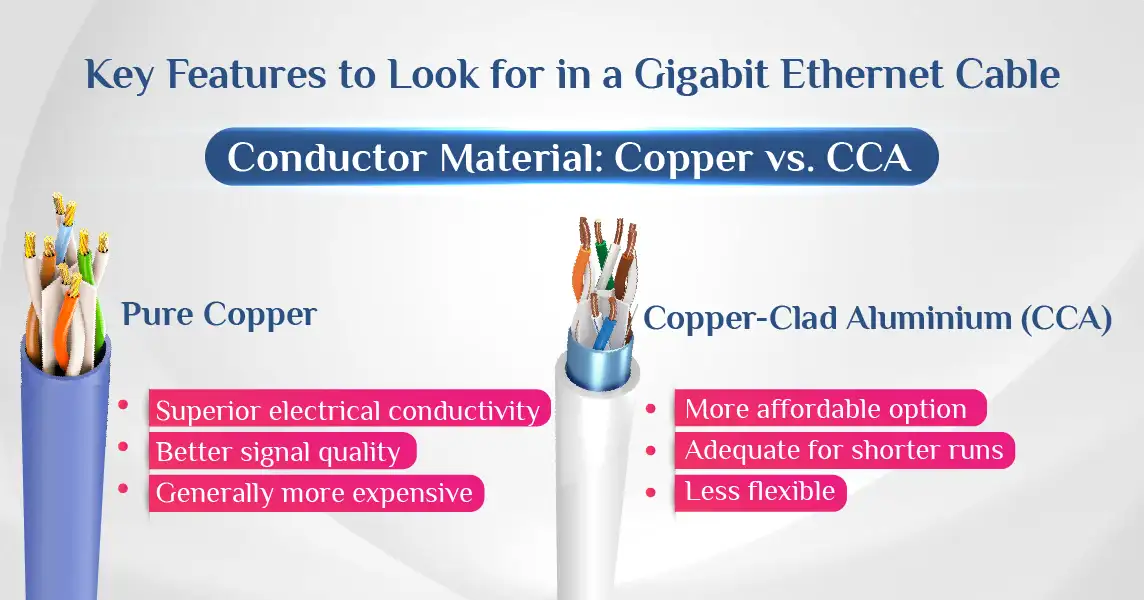
While CCA cables can save money, pure copper cables are a better long-term investment, especially for permanent installations or runs longer than 50 feet.
Cable Length and Performance
When determining what cable for 1GB Ethernet to purchase, remember that length affects performance:
|
Cable Category |
Max Length for 1 Gbps |
Max Length for 10 Gbps |
|
Cat5e |
100 meters (328 ft) |
Not supported |
|
Cat6 |
100 meters (328 ft) |
55 meters (180 ft) |
|
Cat6a |
100 meters (328 ft) |
100 meters (328 ft) |
|
Cat7 |
100 meters (328 ft) |
100 meters (328 ft) |
|
Cat8 |
100 meters (328 ft) |
30 meters (98 ft) |
Always measure carefully and leave some slack for manoeuvrability. Buying a cable that is slightly longer than needed is better than one that barely reaches.
Common Challenges and Troubleshooting Tips
You may encounter issues with the best Ethernet cable for 1 GB internet. Here's how to address common problems.
Dealing with Signal Loss
If you're wondering what Ethernet cable to use for gigabit internet over long distances, signal degradation can occur even with high-quality cables.
To minimize signal loss:
- Keep cable runs under the maximum rated distance
- Avoid sharp bends (maintain at least a 1-inch bend radius)
- Use cable management solutions rather than zip ties, which can pinch cables.
- Invest in quality connectors and proper crimping tools if making your cables.
- Consider adding a network switch rather than running a single long cable
For runs longer than 100 meters, fiber optic cables are a better solution than traditional Ethernet.
Ensuring Compatibility with Devices
Having the right cable is only half the equation. Your devices also need to support gigabit speeds.
To check compatibility:
- Verify your router/modem has gigabit Ethernet ports (labelled as 10/100/1000)
- Confirm your computer's network adapter supports gigabit speeds
- Check that any switches or other network equipment are gigabit-capable
Many users who wonder what Ethernet cable they need for gigabit internet don't realize that their equipment might be the bottleneck rather than the cable itself.
Maintaining Cable Durability
The physical integrity of your Ethernet cable affects its performance and lifespan.
For maximum durability:
- Choose cables with strain relief or snagless connectors
- Use UV-resistant cables for outdoor installations
- Install protective conduit for cables in high-traffic areas
- Label cables clearly to prevent accidental damage during future work
These precautions are particularly important in regions with extreme conditions, such as when selecting the best internet cable wire in Pakistan or other areas with varying climates.
Future-Proofing Your Network: Beyond 1GB Internet
While 1GB of internet is impressive today, technology continues to advance rapidly.
Upgrading to 2GB or 10GB Internet
Service providers are already offering multi-gigabit plans in select areas. If you're planning for the future:
- The best Ethernet cable for 2GB internet would be Cat6a or higher
- For any speed above 2Gbps, you'll definitely want Cat7 or Cat8
- Consider what cable for 10GB Ethernet now if you're installing in hard-to-reach areas
According to networking experts, consumer multi-gigabit adoption is expected to become mainstream within 3-5 years, as streaming resolution increases and cloud computing demands grow.
Trends in Ethernet Technology
The Ethernet standard continues to evolve, with several exciting developments on the horizon:
- Single-Pair Ethernet (SPE) for IoT devices
- Power over Ethernet Plus Plus (PoE++) delivering up to 90W of power
- 25G and 40G are becoming more affordable for prosumer applications
- Flat cable designs improve installation flexibility
Conclusion:
The best Ethernet cable for 1GB internet depends on your specific needs and plans. Cat6 offers the perfect balance of current performance and future-proofing for most home users. Gamers and heavy users should consider Cat6a for its superior shielding and stability.
Cat5e will still reliably deliver gigabit speeds if budget is your primary concern. On the other hand, if you're installing cables in walls or other permanent locations, investing in Cat7 or Cat8 now can save you the hassle of rewiring later.
Remember that your network is only as fast as its slowest component. Having the best Ethernet cable in the world won't help if your router or network card only supports 100 Mbps speeds. For organized connectivity, consider our Cat6 patch panels to streamline your setup.
Have you upgraded your Ethernet cables and noticed a difference? Share your experiences in the comments below, or explore our other networking guides to maximise your internet connection's potential.
FAQ:
Q: What Ethernet cable do I need for 1GB of internet?
A: You need a Cat5e Plenum cable at minimum, but Cat6 or Cat6a is recommended for better performance and future-proofing.
Q: Is Cat5e good enough for gigabit internet?
A: Yes, Cat5e is sufficient for gigabit speeds up to 100 meters, though it may be more susceptible to interference than higher categories. See why Cat6 is better than Cat5e for speed.
Q: What's the best Ethernet cable for gaming?
A: Cat6 or Cat6a cables offer the best low latency and future-proofing for gaming applications.
Q: Can I use a Cat8 cable for 1GB internet?
A: Absolutely, Cat8 will work perfectly with 1GB internet, though it's significantly more expensive than what you actually need.
Q: How long can an Ethernet cable last for 1GB of internet?
A: All Ethernet cable categories support gigabit speeds up to 100 meters (328 feet) before requiring a signal booster or switch.
Q: What's the difference between Cat6 and Cat6a for gigabit internet?
A: Both perform similarly for gigabit internet. The difference becomes apparent with 10 Gbps connections, where Cat6a can maintain speed over longer distances. Read more about Why Cat6a is faster than Cat6.


